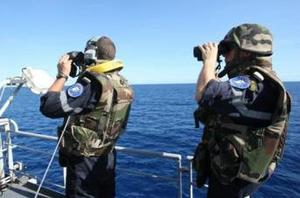ASIS International 2011Counter piracy security expert: "The system is broken"
Piracy off the Horn of Africa has continued to flourish despite the concerted efforts of the world’s navies; a security expert said, “The system is broken here” and called the international counter piracy task force “one of the most expensive catch and release programs” ever; last year the task force spent more than $2 billion responding to sixty-four incidents, or roughly $30 million per incident

International patrols are minimally effective // Source: rfi.fr
Piracy off the Horn of Africa has continued to flourish despite the concerted efforts of the world’s navies.
Currently there are about thirty war ships from fifteen countries operating in the waters near the Gulf of Aden as part of Combined Task Force (CTF) 151, yet in the first three months of 2011 there was an all-time high of 142 pirate attacks, according to the International Chamber of Commerce’s International Maritime Bureau (IMB).
Over the past five years, the number of pirate attacks against ships has risen steadily each year. In 2010, there were a total of 445 reported attacks, an increase of 10 percent from the previous year.
“These figures for the number of hostages and vessels taken are the highest we have ever seen,” said Captain Pottengal Mukundan, the director of the IMB’s Piracy Reporting Centre. “The continued increase in these numbers is alarming.”
The increasing number of pirate attacks comes, despite growing efforts by nations around the world to combat this threat.
“The system is broken here,” said Rudolfo Diaz, the chief operating officer of PICA Corporation and a former Marine Corps infantry officer.
Speaking on a panel at last week’s ASIS 2011 security conference, Diaz called CTF-151 “one of the most expensive catch and release programs” because “many of these pirates aren’t prosecuted.”
As evidence, Diaz said last year the task force spent more than $2 billion responding to sixty-four incidents, or roughly $30 million per incident.
Bolstering Diaz’s point, Chris Rawley, the senior operations planner for U.S. Special Operations Command, who also spoke on the panel, stated CTF-151 simply lacked the resources to effectively prevent piracy.
“You don’t have enough ships,” Rawley explained. “It’s not a trivial matter to patrol this large amount of water. You could fit several continental United States inside the amount of water we’re talking about.”
Established in 2009, CTF-151 operates in the Gulf of Aden and is responsible for an area that stretches out into the Indian Ocean. All together it must patrol an area of approximately 1.1 million square miles.
“The ships are doing a good job, they’re trying. The Navy is out there, but they’re not enough,” Rawley said. “Someone once said it would take over eighty ships to effectively get piracy, and I’m not even sure I agree with that assessment. I think it would probably take even more, but there are simply not enough ships given all the other missions that navies have to do.”
“I don’t know that the governments can provide or afford to provide the entire solution,” concluded Diaz.
With government navies doing the best they can to mitigate the threat of piracy, private shipping companies have been forced to rely on their own anti-piracy countermeasures.
Shipping companies have tried a variety of solutions including installing non-lethal weapons like water cannons, long-range acoustic devices, and barb wire as well as secured safe-rooms with mixed results. Recently, armed security guards aboard ships have become an increasingly popular solution, but private security contracting companies have proven to vary widely in efficacy.
Two weeks ago, several international shipping firms including ICS, Bimco, Intertanko, and Intercargo sent a letter to the United Nations urging the international body to create a UN force of armed military guards to replace the unregulated private security contractors currently deployed aboard merchant ships.
“It is now abundantly clear to shipping companies that the current situation, whereby control of the Indian Ocean has been ceded to pirates, requires a bold new strategy. To be candid, the current approach is not working,” the group, which represents 90 percent of the world merchant fleet, wrote in their letter.
“The shipping industry believes that the situation can only be reversed with a bold approach that targets the problem in manageable pieces. We believe that an important element in this approach would be the establishment of a UN Force of Armed Military Guards that can be deployed in small numbers onboard merchant ships,” the group continued. “This would be an innovative force in terms of UN peacekeeping activity but it would do much to stabilize the situation, to restrict the growth of unregulated, privately contracted armed security personnel and to allow those UN Member States lacking maritime forces – including those in the region most immediately affected – to make a meaningful contribution in the area of counter-piracy.”
In the meantime, piracy is likely to continue as it is a highly lucrative business with an average ransom payout of $5.4 million in 2010. Furthermore, an estimated 33,000 cargo-laden ships pass through the narrow strait of Bab el Mandeb each year making them easy targets for pirates.
“There’s a tremendous amount of targets of opportunity in a choke point, and they’re going to capitalize on that and they have,” Diaz said.
